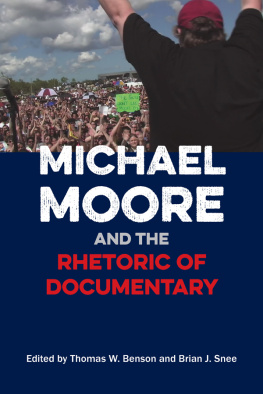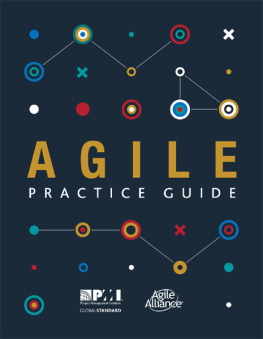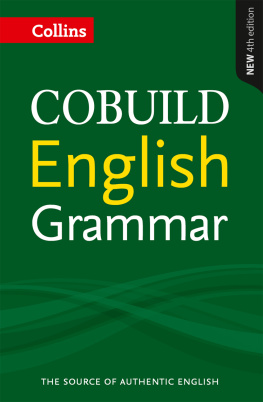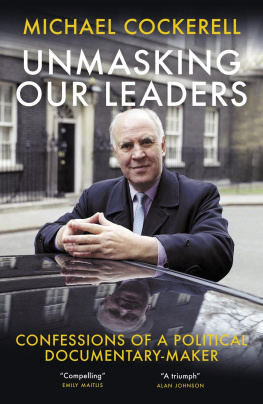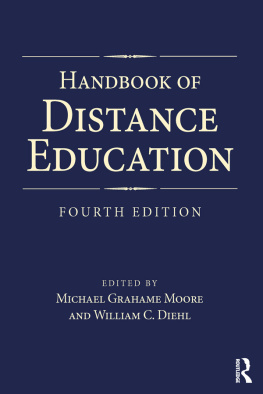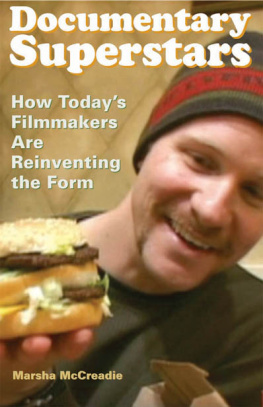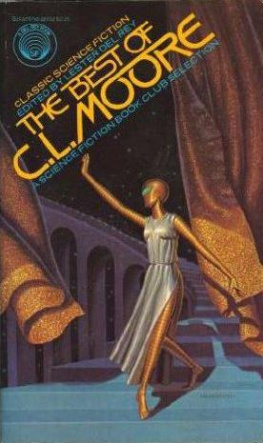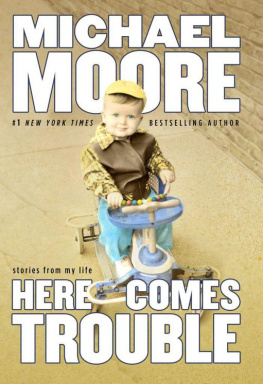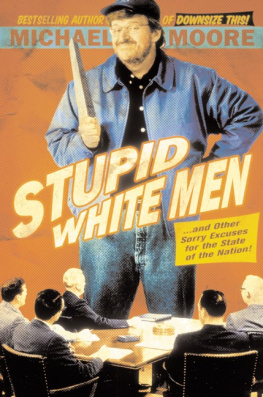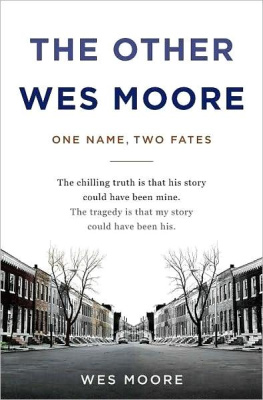coll. - Michael Moore and the Rhetoric of Documentary
Here you can read online coll. - Michael Moore and the Rhetoric of Documentary full text of the book (entire story) in english for free. Download pdf and epub, get meaning, cover and reviews about this ebook. year: 0, genre: Politics. Description of the work, (preface) as well as reviews are available. Best literature library LitArk.com created for fans of good reading and offers a wide selection of genres:
Romance novel
Science fiction
Adventure
Detective
Science
History
Home and family
Prose
Art
Politics
Computer
Non-fiction
Religion
Business
Children
Humor
Choose a favorite category and find really read worthwhile books. Enjoy immersion in the world of imagination, feel the emotions of the characters or learn something new for yourself, make an fascinating discovery.
Michael Moore and the Rhetoric of Documentary: summary, description and annotation
We offer to read an annotation, description, summary or preface (depends on what the author of the book "Michael Moore and the Rhetoric of Documentary" wrote himself). If you haven't found the necessary information about the book — write in the comments, we will try to find it.
coll.: author's other books
Who wrote Michael Moore and the Rhetoric of Documentary? Find out the surname, the name of the author of the book and a list of all author's works by series.
Michael Moore and the Rhetoric of Documentary — read online for free the complete book (whole text) full work
Below is the text of the book, divided by pages. System saving the place of the last page read, allows you to conveniently read the book "Michael Moore and the Rhetoric of Documentary" online for free, without having to search again every time where you left off. Put a bookmark, and you can go to the page where you finished reading at any time.
Font size:
Interval:
Bookmark:

Copyright 2015 by the Board of Trustees,
Southern Illinois University
copyright 2015, Kendall R. Phillips
All rights reserved
Printed in the United States of America
18 17 16 15 4 3 2 1
Cover illustration: The sign reads The Facts Dont Lie: Moore 04
Library of Congress Cataloging-in-Publication Data
Michael Moore and the rhetoric of documentary / edited by Thomas W. Benson and Brian J. Snee.
pages cm
Includes bibliographical references and index.
ISBN 978-0-8093-3407-0 (pbk. : alk. paper)
ISBN 0-8093-3407-0 (pbk. : alk. paper)
ISBN 978-0-8093-3408-7 (ebook)
ISBN 0-8093-3408-9 (ebook)
1. Moore, Michael, 1954 April 23Criticism and interpretation. 2. Documentary filmsPolitical aspectsHistory and criticism. 3. Motion picturesPolitical aspectsUnited States. I. Benson, Thomas W. editor. II. Snee, Brian J. editor.
PN1998.3.M665M525 2015
791.4302'33092dc23
2014034578
The paper used in this publication meets the minimum requirements of American National Standard for Information SciencesPermanence of Paper for Printed Library Materials, ANSI Z39.48-1992. 
Thomas W. Benson and Brian J. Snee
This book is a collection of original essays by scholars and critics who undertake a film-by-film critical analysis of the documentaries of Michael Moore. These close readings of the films illuminate the contributions of Moore to the art of rhetoric and to documentary, analyze the progressive political arguments of the films, and explore how Moore cultivates affect and sentiment not simply to arouse support but also to bring a radical perspective to life as thought and feeling.
Michael Moore has contributed to a renewal of documentary by responding to historical change and opportunity, as the earliest practitioners would have understood. John Grierson, a founder of the documentary idea, wrote in 1942, The materials of citizenship today are different and the perspectives wider and more difficult, but we have, as ever, the duty of exploring them and of waking the heart and will with regard to them. That duty is what documentary is about. Michael Moores own adventure in the materials of citizenship and waking the heart introduced changes that over a quarter of a century have challenged the roots of documentary.
Brian Winston has argued that Michael Moore liberates documentary from the burden Grierson laid on the documentary, while suggesting that Moores films raise additional questions about their own fundamental value as political argument:
The burden Grierson laid on the documentary was to pretend that his films were reports on the news pages, as it were, when in fact they were editorials for the established order. Moore liberates documentary from
We agree with Winston that Michael Moore is certainly making documentary films and that he can be partial, biased, unfair, and simple-minded, and yet these two observations leave much to be discovered about Moores contributions to documentary and to the political conversation. The present collection is our own exploration as scholars of rhetoric and media into the sorts of public rhetoric Michael Moore has created in a hugely successful career as a documentary filmmaker. In our account of Moores reputation and the reception of his films, we rely heavily on responses to Moore in the popular press, not because we suppose they are the best arbiters of Moores achievements in the art of documentarythat will take a long while to sort out, though film scholars in a variety of disciplines have made a good startbut because the popular press both reveals and constructs Moores persona and reputation, both of which have a bearing on the rhetoric of the films. As a rhetorical matter, Moore achieves public status as the author of his works, though it is good to keep in mind from a historical perspective that film is a collaborative art, calling on the skills of many others in preparation, production, postproduction, circulation, and publicity.
Michael Moore was born in Flint, Michigan, on April 23, 1954, to middle-class parents, a General Motors assembly line worker and an office secretary. He was raised in the Catholic Church and educated in Catholic schools. After considering the priesthood, Moore turned his attention to politics and media. According to his biography in the New York Times, Moore won a merit badge as an Eagle Scout by creating a slide show exposing environmentally unfriendly businesses in Flint, and in 1972, when 18-year-olds were granted the right to vote, he ran for a seat on the Flint school board, soon becoming one of the youngest people in the United States to win an election for public office.
After a year at the University of Michigans Flint campus, Moore dropped out of college. He eventually started an alternative newspaper, Moore sued the publication for wrongful dismissal, eventually settling out of court for a small sum that he used as seed money for a documentary about General Motors and the city of Flint.
Roger & Me (1989) changed Michael Moores life and career, and it led some journalists to claim that he had changed the face of documentary film. This is a claim that scholars of the long and distinguished history of documentary might justifiably resist, but it helps us see, from a rhetorical perspective, how rapidly Moore established an outsize public reputation. That reputation came to have a force of its own. Matt Labash of the Weekly Standard writes that pre-Roger, social-conscience documentaries (is there any other kind?) tended to be low-sugar, high-fiber affairs. Whether the subject was striking miners, Great Plains soil erosion, or copulating manatees, these pictures were more medicinal than entertaining. Roger was different, and it became to documentaries what the New Journalism had been to feature writing. Moore infused the form with subjective vitality, inserting himself into his narrative to drive it with a novelists ingenuity. What he delivered in Roger was a dark and devastatingly funny social satirea tautly edited trove of snappy narration, vivid characters, and cruel ironies. Labashs comments about the mainstream documentary are surely oversimplified, but they do reflect something of the public reputation of documentary at the time Moore upended expectations.
Moores documentary was personal, political, funny, and rude. He was on-screen as his own witness and on the sound track as interpreter of the scenes in which he did not appear. He combined biographical and historical accounts with a stirring spirit of radical nostalgia for progressivism and the Social Democratic New Deal compact.
The commercial and critical success of Roger & Me initiated Michael Moores transformation from failed magazine editor to a rich and famous documentary filmmaker. Moore has become a public figure whose name is regularly invoked in connection with politics and public policy, for his unapologetic progressive arguments and for the force of his political persona. His work is cited as a reference point in virtually any serious critical commentary on the current state of documentary, even in books and articles that are about other filmmakers. His political views have become place markers of political journalism and debate, both left and right. Conservatives disparage a position by saying that Michael Moore believes it. It may well be that the public reputation of Moore as a filmmaker obscures the work of many other worthy and influentialand perhaps betterfilmmakers, who prepared the way for him and who will continue to make contributions to documentary after he has moved on. Still, his public reputation remains a touchstone in the popular press.
Font size:
Interval:
Bookmark:
Similar books «Michael Moore and the Rhetoric of Documentary»
Look at similar books to Michael Moore and the Rhetoric of Documentary. We have selected literature similar in name and meaning in the hope of providing readers with more options to find new, interesting, not yet read works.
Discussion, reviews of the book Michael Moore and the Rhetoric of Documentary and just readers' own opinions. Leave your comments, write what you think about the work, its meaning or the main characters. Specify what exactly you liked and what you didn't like, and why you think so.

